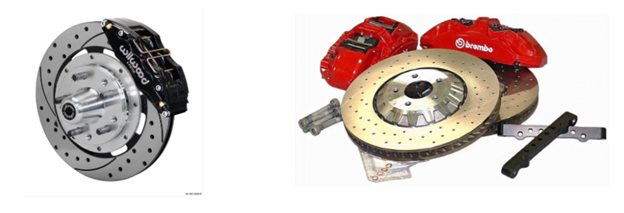Sign up now to join the JEGS email newsletter and be the first to learn about new products, special deals and e-mail only offers!

You replace your old brake rotors with brand-new ones, and after a few days, you see they’re covered in rust. It can feel like a serious problem, but in reality, rust on brake rotors is common and often not a cause for alarm. Surface rust can form in just a few days if the car is exposed to rain or high humidity. However, there’s a difference between light surface rust and deep rust caused by prolonged exposure.
If you’re dealing with rust on your brake rotors, this guide will show you how to remove it safely and prevent it from coming back.
Rust on brake rotors occurs due to three main factors:
Low-Quality Rotors:
Brake rotors without anti-corrosion coatings are more susceptible to rust. Choosing high-quality rotors from manufacturers like Power Stop ensures better resistance to rust formation.
Humidity and Water:
Rain or washing your car can leave water on the brake rotors, which can dry and leave orange or brownish surface rust. This type of rust is light and typically wears off after braking a few times.
Road Salt:
In regions where roads are salted during winter, rust formation on brake rotors accelerates. Salt attracts moisture, exacerbating rust issues. Driving regularly and washing your car helps minimize this risk.
Prolonged Inactivity:
When a vehicle sits unused for extended periods, even in a garage, humidity in the air can lead to rust formation. This process happens more slowly indoors but still occurs over time.
Sign up now to join the JEGS email newsletter and be the first to learn about new products, special deals and e-mail only offers!

Cleaning rust off brake rotors can range from simple to more involved, depending on the severity of the rust. Here’s how to do it:
In cases where rust is too severe or the rotors are too thin, replacing the rotors is often the best solution. High-quality rotors are an investment in your vehicle’s safety and performance.
If the rust persists, consider disassembling the brakes and soaking the rotors in a mixture of salt and white vinegar for 12 hours.
Preventative measures are key to keeping rust at bay:
After driving in the rain, apply the brakes lightly before parking to generate heat. This helps dry the rotors and prevents rust formation.
Park Indoors
Parking in a garage reduces exposure to rain and humidity. During winter, this also minimizes exposure to road salt.
Drive Regularly
Regular driving ensures the brake pads engage with the rotors, removing light surface rust before it can spread.
Keep Your Car Clean
Wash your car at least every other week, especially during winter, to remove road salt and debris. Avoid driving on salted roads whenever possible.
Choose Quality Rotors
Invest in rotors with anti-corrosion coatings. These coatings provide extra protection against rust and are worth the investment.
Dry Your Rotors
Using compressed air or towels, dry the rotors to remove water and reduce the chances that rust forms.
If rust has already formed, or you want to prevent it, JEGS has all the tools and brake products you need. From high-quality brake cleaners and brushes to anti-corrosion-coated rotors, we’ve got you covered.
Not sure which products are right for your car? Reach out to our team for expert advice. Keeping your brakes in top condition is just a click away.
Rust on brake rotors might look alarming, but it’s often easy to manage. Whether you’re tackling light surface rust or dealing with deeper corrosion, the steps outlined here will help you clean and maintain your rotors safely.
Preventative care, such as driving regularly, parking indoors, and choosing high-quality rotors, can save you time and effort in the long run. And when you need tools or parts, JEGS is here to help with everything you need for the job.
Protect your brakes and keep your car performing at its best—shop with JEGS today!




Leave a Reply